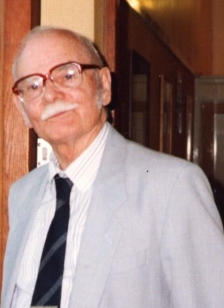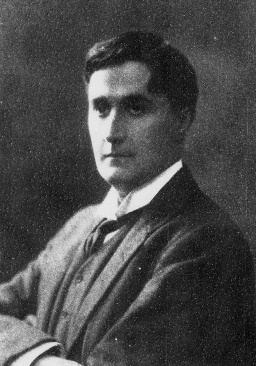Related Research Articles
This is a bibliography of works by Rudyard Kipling, including books, short stories, poems, and collections of his works.
"Land of Hope and Glory" is a British patriotic song, with music by Edward Elgar, written in 1901 and with lyrics by A. C. Benson later added in 1902.
Sea Pictures, Op. 37 is a song cycle by Sir Edward Elgar consisting of five songs written by various poets. It was set for contralto and orchestra, though a distinct version for piano was often performed by Elgar. Many mezzo-sopranos have sung the piece.

Patrick Hawes is a British composer, conductor, organist and pianist.

Ian Parrott was a prolific Anglo-Welsh composer and writer on music. His distinctions included the first prize of the Royal Philharmonic Society for his symphonic poem Luxor, and commissions by the BBC and Yale University, and for many leading British musicians. In 1958 his cor anglais concerto was first performed at Cheltenham Festival, and in 1963 his cello concerto was given by William Pleeth and the Hallé Orchestra – both concertos were conducted by Sir John Barbirolli.

The Five Mystical Songs are a musical composition by English composer Ralph Vaughan Williams (1872–1958), written between 1906 and 1911. The work sets four poems by seventeenth-century Welsh poet and Anglican priest George Herbert (1593–1633), from his 1633 collection The Temple: Sacred Poems. While Herbert was a priest, Vaughan Williams himself was an atheist at the time, though this did not prevent his setting of verse of an overtly religious inspiration. The work received its first performance on 14 September 1911, at the Three Choirs Festival in Worcester, with Vaughan Williams conducting.
Was it some Golden Star? is a poem written by Gilbert Parker, published in Volume I of a series of poems called Embers. It was set to music by the English composer Edward Elgar in 1910, as his Op. 59, No. 5.
Twilight is a song with music by the English composer Edward Elgar written in 1910 as his Op. 59, No. 6. Elgar set the words of the poem The Twilight of Love, from Volume 2 of a series of poems called Embers by Sir Gilbert Parker. The Opus 59 songs were part of a song-cycle of six romantic songs by Parker that was never completed – Nos 1, 2 and 4 were never composed. The other songs were Oh, soft was the song and Was it some Golden Star?. The songs were originally written with piano accompaniment, but this was later re-scored by the composer for full orchestra.
Oh, soft was the song is a song with words by Gilbert Parker set to music by the English composer Edward Elgar in 1910, as his Op. 59, No. 3. It is the second and last verse of a poem At Sea which Parker published in Volume I of a series of poems called Embers. The Opus 59 songs were part of a song-cycle of six romantic songs by Parker that was never completed – Nos 1, 2 and 4 were never composed. The other songs were Was it some Golden Star? and Twilight. The songs were originally written with piano accompaniment, but this was later re-scored by the composer for full orchestra.
"Follow the Colours" is a marching song written by the English composer Edward Elgar in 1907, with words by Capt. William de Courcy Stretton. The song is for male voice solo with an optional male voice chorus, accompanied by piano, orchestra or military band.

”Inside the Bar" is a song written in 1917 by the English composer Edward Elgar, with words by Sir Gilbert Parker.
"A Song in Storm" is a poem written by Rudyard Kipling (1865-1936).
"The Sweepers" is a poem written by Rudyard Kipling (1865-1936), and set to music by the English composer Edward Elgar in 1917, as the fourth of a set of four war-related songs on nautical subjects for which he chose the title "The Fringes of the Fleet".
"Submarines" is a poem written by Rudyard Kipling (1865-1936), and set to music by the English composer Edward Elgar in 1917, as the third of a set of four war-related songs on nautical subjects for which he chose the title "The Fringes of the Fleet".

The Fringes of the Fleet is a booklet written in 1915 by Rudyard Kipling (1865–1936). The booklet contains essays and poems about nautical subjects in World War I.
Carillon is a recitation with orchestral accompaniment written by the English composer Edward Elgar as his Op. 75, in 1914. The words are by the Belgian poet Émile Cammaerts.
Charles James Mott was an English baritone.
Pageant of Empire is the title given to a set of songs, to words by Alfred Noyes, written by the English composer Sir Edward Elgar and given important positions in the Pageant of Empire at the British Empire Exhibition at Wembley Park.
"Big Steamers" is a poem by Rudyard Kipling, first published in 1911 as one of his twenty-three poems written specially for C. R. L. Fletcher's "A School History of England". It appears in the last chapter of the book. It is intended for children, with the verses responding with facts and humour to their curiosity about the 'big steamers' - as the merchant ships are called.
References
- ↑ Kennedy, Michael (1987). Portrait of Elgar (Third ed.). Oxford University Press. p. 354. ISBN 0-19-284017-7.
1917 Vocal: The Fringes of the Fleet (R. Kipling), four songs for four baritones and orchestra. 1. The Lowestoft Boat; 2. Fate's Discourtesy; 3. Submarines; 4. The Sweepers.